Intro
Learn about Hib vaccine protection, its benefits, and how it prevents Haemophilus influenzae type b infections, ensuring child health and immunity through vaccination.
The Hib vaccine, also known as the Haemophilus influenzae type b vaccine, has been a crucial component in the prevention of invasive Hib disease, particularly in children. Since its introduction, the Hib vaccine has significantly reduced the incidence of Hib-related illnesses, such as meningitis, pneumonia, and septicemia. The importance of the Hib vaccine cannot be overstated, as it has saved countless lives and prevented long-term health complications. In this article, we will delve into the world of Hib vaccine protection, exploring its benefits, working mechanisms, and the impact it has had on public health.
The Hib vaccine is a conjugate vaccine, which means it is made by combining the weakened Hib bacteria with a carrier protein. This combination enhances the immune system's response to the vaccine, providing long-term protection against Hib infection. The vaccine is typically administered in a series of doses, starting at 2 months of age, with subsequent doses given at 4, 6, and 12-15 months of age. This schedule allows for optimal protection against Hib disease, which is most severe in young children.
The importance of the Hib vaccine lies in its ability to prevent invasive Hib disease, which can have devastating consequences if left untreated. According to the Centers for Disease Control and Prevention (CDC), Hib disease can cause meningitis, an infection of the lining around the brain and spinal cord, as well as pneumonia, septicemia, and other serious infections. The Hib vaccine has been shown to be highly effective in preventing these illnesses, with a reported efficacy rate of 90-100% in preventing invasive Hib disease.
Hib Vaccine Benefits
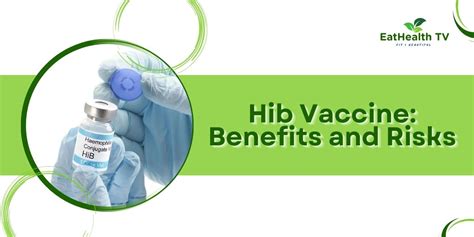
The benefits of the Hib vaccine are numerous and well-documented. Some of the most significant advantages of the Hib vaccine include:
- Prevention of invasive Hib disease, including meningitis, pneumonia, and septicemia
- Reduction in the risk of long-term health complications, such as hearing loss, brain damage, and developmental delays
- Protection against Hib-related illnesses, such as otitis media (middle ear infections) and sinusitis
- Enhanced immune system function, which can help prevent other infections and diseases
- Reduced risk of transmission to others, including family members and caregivers
How the Hib Vaccine Works
The Hib vaccine works by introducing a small, harmless piece of the Hib bacteria to the body, which triggers an immune response. This response involves the production of antibodies, which are proteins that recognize and attack the Hib bacteria. The antibodies produced in response to the Hib vaccine provide long-term protection against Hib infection, making it an essential tool in the prevention of invasive Hib disease.Hib Vaccine Side Effects
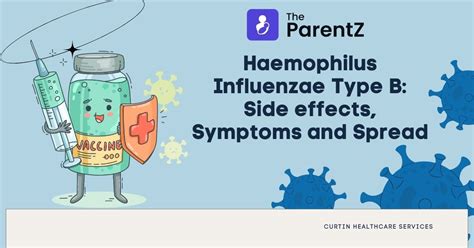
Like all vaccines, the Hib vaccine can cause side effects, although these are typically mild and short-lived. Some common side effects of the Hib vaccine include:
- Redness, swelling, and pain at the injection site
- Fever
- Irritability
- Loss of appetite
- Vomiting
- Diarrhea
It is essential to note that the benefits of the Hib vaccine far outweigh the risks, and the vast majority of children who receive the vaccine do not experience any serious side effects.
Hib Vaccine Schedule
The Hib vaccine schedule is designed to provide optimal protection against Hib disease, which is most severe in young children. The typical schedule for the Hib vaccine is as follows: * 2 months of age: First dose * 4 months of age: Second dose * 6 months of age: Third dose * 12-15 months of age: Fourth dose (booster shot)It is crucial to follow the recommended schedule to ensure that your child receives the best possible protection against Hib disease.
Hib Vaccine Effectiveness
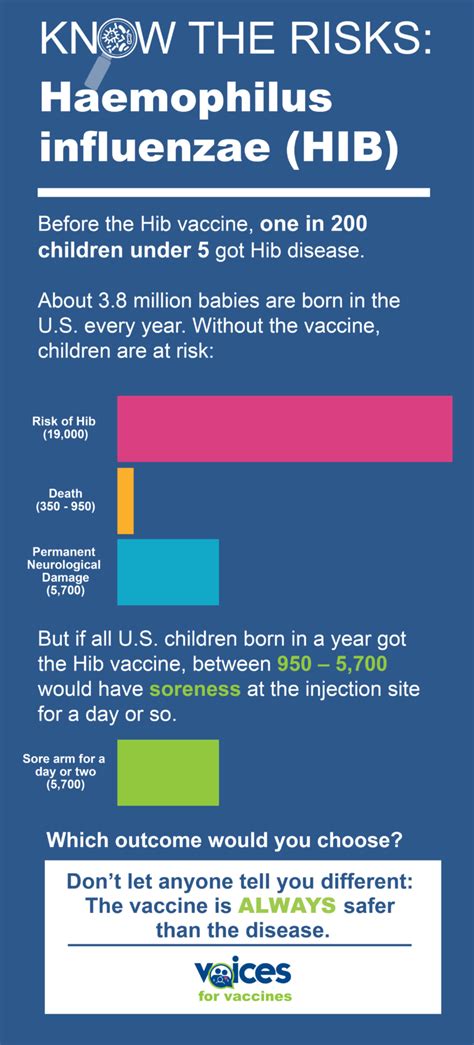
The Hib vaccine has been shown to be highly effective in preventing invasive Hib disease. According to the CDC, the Hib vaccine has:
- Reduced the incidence of Hib disease by 90% since its introduction
- Prevented thousands of cases of meningitis, pneumonia, and septicemia
- Saved countless lives and prevented long-term health complications
The Hib vaccine is an essential tool in the prevention of invasive Hib disease, and its effectiveness has been consistently demonstrated in numerous studies and trials.
Hib Vaccine and Other Vaccines
The Hib vaccine is often administered in combination with other vaccines, such as the diphtheria, tetanus, and pertussis (DTP) vaccine and the inactivated poliovirus vaccine (IPV). This combination is known as the DTaP-IPV-Hib vaccine, which provides protection against multiple diseases with a single injection.Hib Vaccine Recommendations
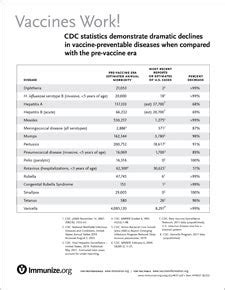
The Hib vaccine is recommended for all children, with the following guidelines:
- Children should receive the Hib vaccine at 2, 4, 6, and 12-15 months of age
- Children who are behind schedule or have missed doses should receive the Hib vaccine as soon as possible
- Children with certain medical conditions, such as sickle cell disease or HIV infection, may require additional doses or a different schedule
It is essential to consult with your healthcare provider to determine the best vaccination schedule for your child.
Hib Vaccine and Travel
If you are planning to travel with your child, it is essential to ensure that they are up-to-date on all recommended vaccinations, including the Hib vaccine. This is particularly important if you are traveling to areas with high rates of Hib disease.Hib Vaccine Safety
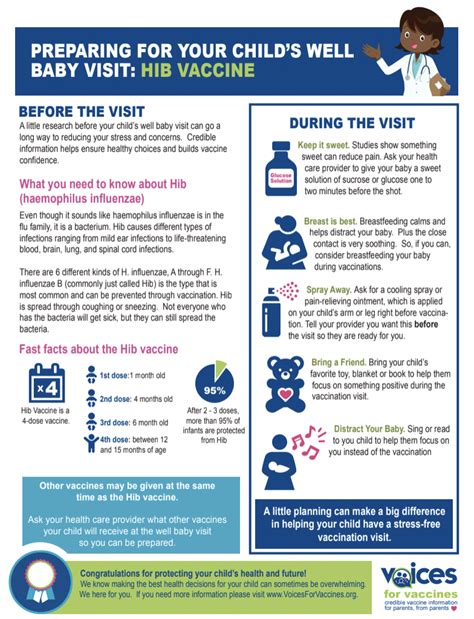
The Hib vaccine has an excellent safety record, with few reported side effects. However, as with any vaccine, there is a small risk of an allergic reaction or other adverse event.
Hib Vaccine and Pregnancy
The Hib vaccine is not recommended for pregnant women, as there is limited data on its safety in this population. However, if a pregnant woman is at high risk of exposure to Hib disease, such as in a outbreak situation, the vaccine may be recommended.Hib Vaccine Cost
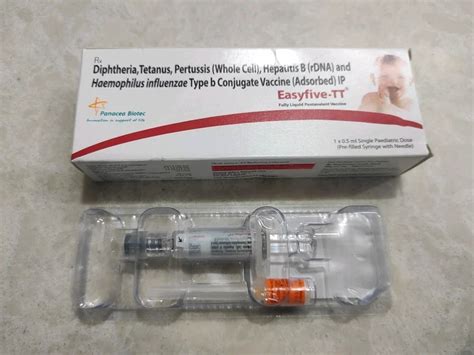
The cost of the Hib vaccine can vary depending on the location and healthcare provider. However, the vaccine is typically covered by insurance and is available at a low cost or no cost through government-funded programs, such as the Vaccines for Children (VFC) program.
Hib Vaccine Availability
The Hib vaccine is widely available in the United States and many other countries. It can be administered by healthcare providers, including pediatricians, family medicine physicians, and nurse practitioners.Hib Vaccine Future Directions
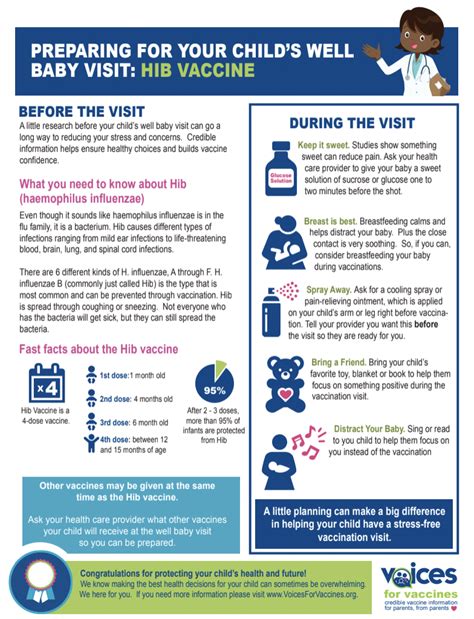
Research is ongoing to improve the Hib vaccine and develop new vaccines against other types of Haemophilus influenzae. Some potential future directions include:
- Development of a Hib vaccine that can be administered orally, rather than via injection
- Creation of a vaccine that protects against multiple types of Haemophilus influenzae
- Improvement of the vaccine's effectiveness in certain populations, such as older adults or individuals with weakened immune systems
As our understanding of the Hib vaccine and its effects on the body continues to evolve, we can expect to see new and innovative approaches to preventing Hib disease.
What is the Hib vaccine, and how does it work?
+The Hib vaccine is a conjugate vaccine that protects against Haemophilus influenzae type b (Hib) disease. It works by introducing a small, harmless piece of the Hib bacteria to the body, which triggers an immune response and provides long-term protection against Hib infection.
Who should receive the Hib vaccine, and what is the recommended schedule?
+The Hib vaccine is recommended for all children, with the typical schedule being 2, 4, 6, and 12-15 months of age. Children who are behind schedule or have missed doses should receive the Hib vaccine as soon as possible.
What are the potential side effects of the Hib vaccine, and how common are they?
+The Hib vaccine can cause side effects, such as redness, swelling, and pain at the injection site, fever, irritability, loss of appetite, vomiting, and diarrhea. However, these side effects are typically mild and short-lived, and the benefits of the vaccine far outweigh the risks.
Can the Hib vaccine be administered with other vaccines, and what are the benefits of combination vaccines?
+Yes, the Hib vaccine can be administered with other vaccines, such as the diphtheria, tetanus, and pertussis (DTP) vaccine and the inactivated poliovirus vaccine (IPV). Combination vaccines, such as the DTaP-IPV-Hib vaccine, provide protection against multiple diseases with a single injection, which can improve vaccination rates and reduce the number of injections required.
What are the long-term benefits of the Hib vaccine, and how has it impacted public health?
+The Hib vaccine has had a significant impact on public health, reducing the incidence of Hib disease by 90% since its introduction. The vaccine has prevented thousands of cases of meningitis, pneumonia, and septicemia, and has saved countless lives and prevented long-term health complications.
In conclusion, the Hib vaccine is a crucial component in the prevention of invasive Hib disease, particularly in children. Its benefits, working mechanisms, and impact on public health make it an essential tool in protecting against this serious and potentially life-threatening illness. By understanding the importance of the Hib vaccine and staying up-to-date on the latest recommendations and research, we can continue to improve vaccination rates and reduce the risk of Hib disease. We invite you to share your thoughts and questions about the Hib vaccine in the comments below, and to spread the word about the importance of vaccination in preventing serious diseases.
